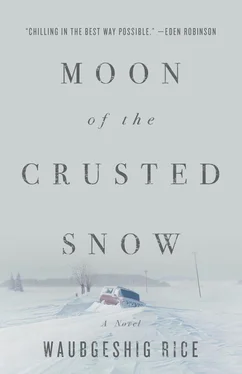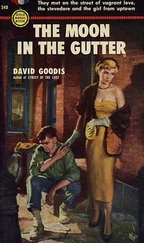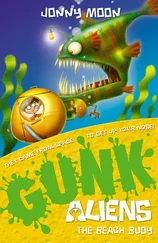She pulled her scratched sunglasses back down over her eyes and walked back out into the mid-morning sunshine. It gleamed on her bare brown shoulders. She shut the door behind her without locking it and stepped down the creaky stairs. Her kids and their grandparents waited for her in the driveway.
Dan Whitesky leaned against the warm blue metal of Evan’s old truck with his arms crossed, his red cap pulled low to shade his eyes. Nicole’s father stood beside him, dressed similarly, but in different faded colours. They tied their long hair behind their heads with tiny strips of deer hide, concealing the ponytails. Her mother, Theresa stood in front of them, comfortable in her dirty grey T-shirt, tattered jean shorts, and sandals as the summer morning heated up. In the shade on the grass on the other side of the driveway, Patricia Whitesky and the two children threw a wobbly yellow frisbee back and forth.
Nicole approached the truck. Theresa put her arms around Nicole without saying anything. They broke the embrace, and Nicole stepped back to lift her glasses and wipe her eyes. Almost on cue, the children ran up to her, not sensing anything wrong. She smiled and laughed as they each wrapped their arms around her legs.
Maiingan looked up at her. His long brown hair fell over his shoulders now, as long as his little sister’s. Seven years old, the boy was growing taller. He had grown up so much since the lights went out nearly two years before, but his youthful exuberance remained intact. “Did you get my fishing rod, Mommy?” he asked.
“Yes, my boy,” she replied. His joy and enthusiasm grounded her and always reassured her about their family’s road ahead. “Your tackle box too. It’s all in there,” she motioned with her head to the packed trailer that the adults would take turns pulling into the bush.
The structures they were leaving behind would likely stand for a few more generations. The homes were perfectly viable shelters from the cold and rain. The band office, the shop, and all the other community buildings would probably last even longer. And all the infrastructure was most likely still functional. But there was no use for any of it.
Along with half the people who had lived here, the fledgling spirit they had been trying to nourish in this place had died. There was no use staying somewhere that had become so tragic. The bad memories and the sadness had smothered the good so many people had worked so hard to sustain, even in the wake of the darkness that befell them.
And when it became clear to them that they were never supposed to last in this situation on this land in the first place, they decided to take control of their own destiny. Their ancestors were displaced from their original homeland in the South and the white people who forced them here had never intended for them to survive. The collapse of the white man’s modern systems further withered the Anishinaabeg here. But they refused to wither completely, and a core of dedicated people had worked tirelessly to create their own settlement away from this town.
They also couldn’t be certain there wouldn’t be more visitors. None had come since the arrival of those from the South in those first scary months. But if civilized life remained in the cities and towns around them, the mass migration was likely already underway. No one wanted to deal with any more of them. Not now.
“Is my fishing rod in there too, Mommy?” asked Nangohns, now old enough to know how to cast — or at least drop — a line into the water.
“You bet, my girl.”
“Can we go fishing today?”
“Probably. It won’t take us that long to get there.”
“Yay!” the five-year-old started jumping up and down.
Patricia put her hand on Nicole’s shoulder. “Well, you ready?”
“As ready as I’m gonna be.”
“Okay then, let’s go.”
Nicole nodded and looked back down at her son and daughter. “Okay, guys,” she said. “Let’s go see Daddy. He’s waiting for us.”
Dan lifted the hitch of the trailer and began pulling it around the house. The rest followed in single file. They went past the shack and the firepit and hide tanning rack in the back. They reached a clearing that led to a path through the bush. They stepped onto the trail, one by one, to begin this new life nestled deep in the heart of Anishinaabe territory.
They didn’t look back.
I acknowledge and thank the Canada Council for the Arts and the Ontario Arts Council for their grant programs that supported me in the writing of this novel. As an emerging writer, I’m very grateful for these councils and the important work they do promoting and empowering literary voices in Canada. I would never have fulfilled my dream of becoming a published author without these grants.
I am extremely grateful to my employer, the Canadian Broadcasting Corporation, for allowing me to take leave from my duties as a journalist for months at a time to focus on this story and get it written. I am very fortunate to work for an organization that values and supports all my storytelling endeavours.
Thanks also to the Banff Centre for inviting me to their beautiful mountainside compound for two weeks in the fall of 2015, where the writing of this novel began. I’ll always remember where I was when I wrote that first sentence on the screen.
The greatest support of all comes from my life partner, Sarah. She’s always the first to lay eyes on my written stories, and her critical feedback in those early days is essential. I must give enormous thanks and love to my wife for always being my first proofreader and biggest booster. I would not have made it this far on this path without her support and advice. She motivates me every day to carry myself with honour and respect. G’zaagin!
This story would not have become a novel without the keen eye and editing expertise of the mighty Susan Renouf. She read a first draft years ago while we were discussing another literary project, and decided she wanted to take it on. She believed in this story from the beginning, which filled my heart with promise. Her masterful editing and constructive encouragement greatly bolstered the narrative from start to finish. Huge thanks, Susan.
I must acknowledge and thank the rest of the team at ECW Press, who were nothing but a delight to work with as this book developed and emerged. Everyone has made me feel right at home throughout this process, from editorial to marketing. I couldn’t have asked for a better publisher for this project. Gratitude to Jen Knoch and Laura Pastore, who took the last passes at the manuscript and further polished it.
Because the story is set in a fictional location a little farther north than my home territory, I asked the extremely resourceful Derek Fox of Bearskin Lake First Nation to take a look at an early draft. As someone who grew up in northwestern Ontario, he offered very valuable insights that helped me paint a better picture of the community and its unique characteristics and challenges. Chi-miigwech, Derek!
There are bits of very basic Anishinaabemowin scattered throughout this novel. Those words and phrases reflect my own rudimentary understanding of the language, but I did need some assistance with honing in on some specific elements. My brother Mskwaankwad was immensely helpful throughout the writing of this book, answering texts and phone calls and providing his own insights as an Anishinaabemowin teacher. Chi-miigwech n’shiimenh!
The windigo is a looming, often implicit figure in this story. The figure is hinted at, but its image doesn’t emerge until closer to the end. The written references are based on stories I heard from elders in my community as I grew up. Many of these stories came from my own father, John Rice, and elder relatives like my aunt, Clara Baker. The dream image of the creature written here is also an homage to legendary Anishinaabe storyteller and author Basil Johnston, who documented important windigo tales in his books like The Manitous .
Читать дальше












